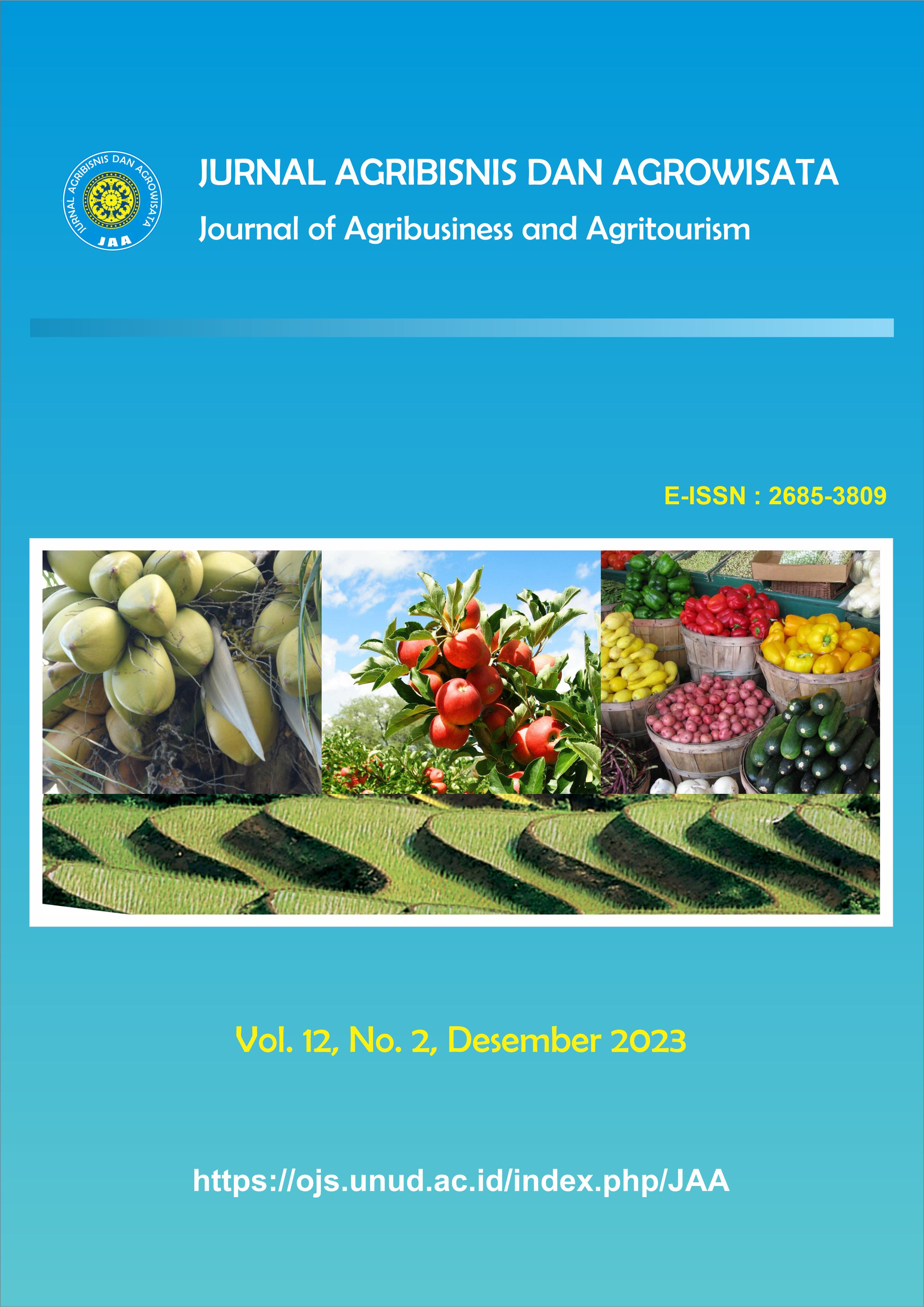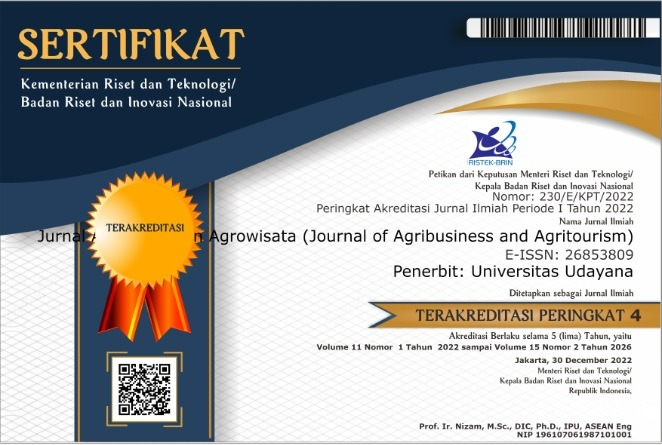Hubungan Modal Sosial dengan Tingkat Partisipasi Petani dalam Pembangunan Agrowisata Cau Chocolates di Desa Tua, Kecamatan Marga, Kabupaten Tabanan
Abstract
The Correlation of Social Capital With The Participation Level of Farmer In The Development Of Cau Chocolates Agrotourism in Tua Village, Marga District, Tabanan Regency. The rapid development of tourism in Bali not only has a positive impact but also has a negative impact on the agricultural sector. Various negative impacts that arise give rise to efforts to develop alternative tourism. One form of effort to integrate the agricultural and tourism sectors in Bali Province is to develop agro-tourism areas. Cau Chocolates Agrotourism is one of the cocoa agrotourism in Tabanan. The development of agro-tourism cannot be separated from social capital and the participation of farmer groups. The aim of this study is to determine the extent of the correlation between social capital and farmer group participation in the development of Cau Chocolates Agrotourism, Tua Village, Marga District, Tabanan Regency. The data analysis method used is descriptive qualitative and Spearman Rank Correlation Analysis. The results showed that the correlation between social capital and the participation of the Pala Werdhi Farmer Group in the development of Cau Chocolates Agrotourism as a whole was moderate but only significant at three stages. Social capital is significantly correlated with participation in the planning stage, implementation stage, and enjoying the results stage, but not significantly correlated at the evaluation stage. Suggestions that can be conveyed in this study are that further research is needed on the factors driving participation to increase the participation of members of the Pala Werdhi farmer group and there needs to be more assistance and training to the Pala Werdhi farmer group, especially in cocoa cultivation, in order to increase the quantity or quality of the cocoa.
Downloads
References
Hasbullah J. 2006. Social Capital : Menuju Keunggulan Budaya Manusia Indonesia. http://lib.ui.ac.id/file?file=pdf/metadata-94231.pdf. Diunduh pada September 2017
Huraerah, Abu. (2008). Pengorganisasian, Pengembangan Masyarakat Model dan Strategi Pembangunan Berbasis Masyarakat. Bandung: Humaniora.
Ibrahim, Linda D. 2006. Kehidupan Berorganisiasi sebagai Modal Sosial Komunitas Jakarta. Jurnal Fakultas Ilmu Sosial dan Ilmu Politik. http://repository.ui.ac.id/contents/koleksi/16/8b7dd1364168990345ec3fe4d397626c097b8dd2.pdf. Diunduh pada Januari 2018
Inayah. 2012. Peranan Modal Sosial dalam Pembangunan. Jurnal Pengembangan Humaniora.
https://pdfcoffee.com/download/paper6-apr-2012-f-inayah-pdf-free.html
Diunduh Pada Januari 2018.
Rosyida I, Nasdian FT. 2011. Partisipasi Masyarakat dan Stakeholder dalam Penyelenggaraan Program Corporate Social Responsibility (CSR) dan Dampaknya Terhadap Komunitas Pedesaan. Bogor:Institut Pertanian Bogor.
Sinaga, R. 2012. Peran Modal Sosial dalam Mendorong Sektor Pendidikan dan Pengembangan Wilayah di Kecamatan Garoga Kabupaten Tapanuli Utara. http://repository.usu.ac.id/handle/123456789/31692. Diunduh pada September 2017.
Sugiyono. 2010. Metode Penelitian Kuantitatif, Kualitatif dan R&D. Bandung: Alfabeta.
Sugiyono. 2014. Metode Penelitian Bisnis: Pendekatan Kuantitatif, Kualitatif, dan R&D. Bandung: Alfabeta
Yuliarmi, N.N. 2011. Peran Modal Sosial Dalam Pemberdayaan Industri Kerajinan Di Provinsi Bali. Denpasar: Universitas Udayana







